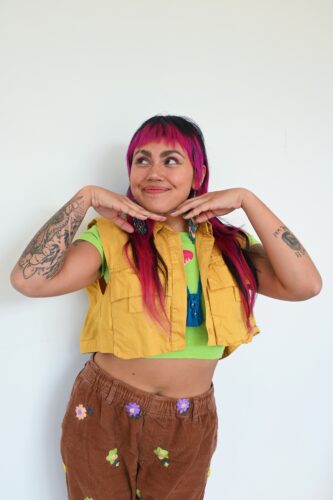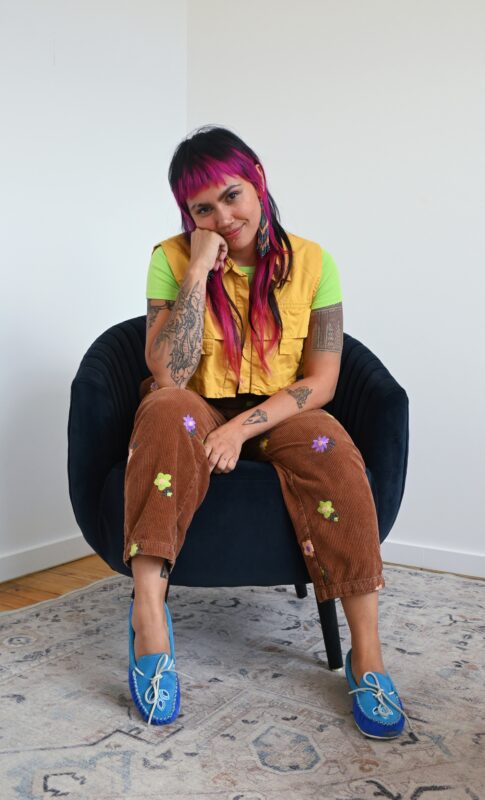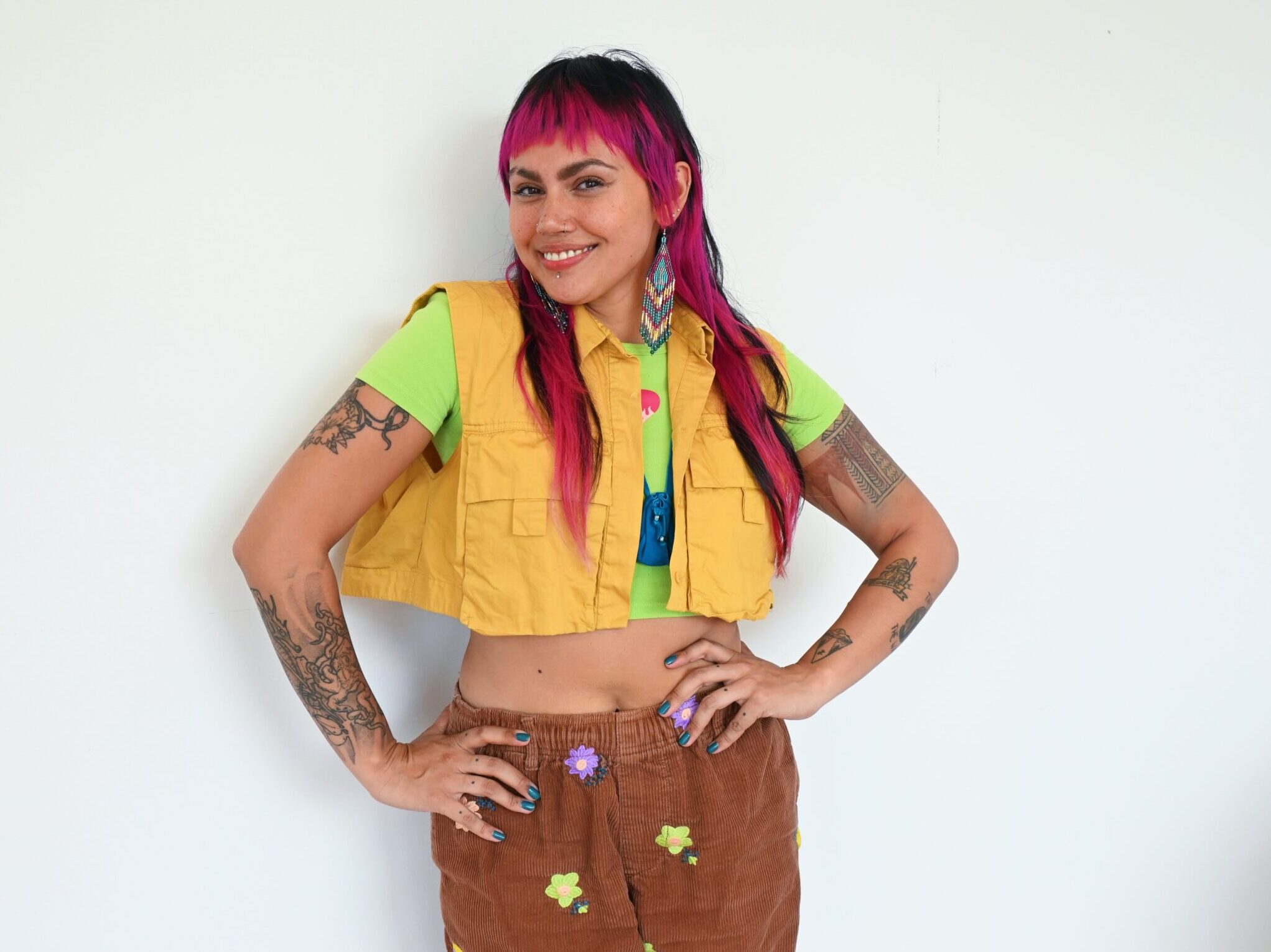Haley Robinson grew up as a musical theatre kid with a deep love and appreciation for the arts. But a few years ago, they were feeling lost. Disconnected. Alone. They didn’t see themselves as a creative person…at all.
That all changed during the pandemic. As more and more people turned to social media for connection and community, Robsinson began making videos on TikTok. What started as a fun way to make dance videos and speak their mind quickly snowballed into a career, a creative outlet, and a beautiful community that resonates with Robinson’s experience as a queer, mixed-race adoptee.
“I went onto social media as a way to share my story of reconnecting to my bio family, to my cultures, of getting more in tune with my queer identity. I had just freshly become sober as well,” Robinson says. “It kind of exploded from there.”
Robinson has amassed more than 100K followers on TikTok and 57K+ on Instagram. They are an ambassador for both Sexfluent (an online non-profit a part of CANFAR: Canadian Foundation of AIDS Research) and MADE | NOUS (which celebrates Canadian media).
Robinson’s content is refreshing, honest and unapologetic, with a balance of comedic and earnest moments. They bring to light the subtle (and not-so-subtle) ignorance they are subjected to as a queer, Indigenous person, and speak out about issues like Missing and Murdered Indigenous Women and Girls, the power of harm reduction, and the widespread effects of colonization.
View this post on Instagram
We’ve been publishing our Artist of the Month series for nearly a year, but this edition will be the first where our featured artist is best known for their online presence. Robinson is all too familiar with the assumptions that are associated with social media content creation: that influencers are all rich, with easy jobs, that their work shouldn’t be considered art.
“I am the director, scriptwriter, I’m the actor, I’m the camera person, I’m the sound person… I’m everything!,” Robinson says. “It’s a lot of work.”
When we meet Robinson, there is no doubt that they’ve come a long way from that lonely period, when they didn’t consider themselves an artist. When they walk into our office, wearing a neon green t-shirt under a cropped yellow vest, brown corduroy pants adorned with flowers, and long, dangly, beaded earrings, they exude confidence and pride in who they are.
But it’s more than just skin deep—during our chat, they launch into several joyful stories we can’t get enough of. The time they saw Snotty Nose Rez kids and ate Indian tacos with a friend they met online. Going to a drag bar in Ottawa for the first time. Filming an Indigenized spoof of That ‘70s Show in the middle of the night in Gatineau—a video that blew up online and was acknowledged by Cheech & Chong.
It’s clear that some of their happiest memories are intertwined with their online presence. But this all began offline, with a major personal journey that didn’t start in the happiest place.

Robinson is Cree and Filipinx, but they grew up in Alberta, adopted into a white, Christian family. They tell us this made for a confusing childhood, constantly trying and failing to fit into the roles society had laid out for them.
“I was always trying to present myself as a white person, even though I’m very clearly not a white person,” they tell us. They were disconnected from their culture, their identity as a queer, Two-Spirit person, and from their biological family. It was isolating, and lonely.
When they began reconnecting with their Indigenous and Filipinx families, it was a healing experience all around. “My family grew like, 20 times!” they say. “Being able to reconnect to my bio family and my culture really helped me understand exactly where I come from…connecting to my cultures and my traditions helped me come into my own skin and be proud of where I come from. Be proud of my family, my heritage, my background.”
But Robinson still felt alone in their journey. “I didn’t know if other people were going through what I was going through. I’m adopted, I’m queer, I’m mixed race. It was a lot. Is anybody else out there like this?”

It turns out, there are thousands who resonate with Robinson’s story. They began to share this huge transformative journey with the Internet, and in doing so, they found what they needed most: community.
“What I was really thankful for coming into the queer and BIPOC community was just how open and accepting they are…they just really cared for me growing and becoming my true authentic self,” Robinson shares, adding that they have made countless genuine connections through social media since they began posting during the pandemic. “I don’t look at it as they are followers and I’m a creator, or anything like that. I look at it like we’re just a bunch of people coming together to create a community, and that’s what I really love about it.”
With all of this support, and a stronger connection to their identity and authentic self, Robinson felt a call to give back to the community that helped them flourish. “If I was going to take up these spaces, I might as well do something with it, advocate for rights, for gender identity, for mental health.”
Robinson was approached to work for Sexfluent, and later MADE | NOUS. As a Sexfluent ambassador, their focus is creating a safe, non-judgmental space to learn about sexual and mental health, as well as harm reduction, and how these issues intersect with the Indigenous community. As one of three ambassadors for MADE | NOUS, Robinson highlights Canadian and Indigenous creators in film, TV, video games and digital entertainment. For Robinson, being an ambassador on these platforms has been a full-circle experience.
View this post on Instagram
“Growing up, I wish that I had that education and those resources. So now I feel like I’m doing that, I’m being the resource.”
But being the resource, the face, constantly putting yourself out there, can come at a cost.
“I’ve made videos, which I really love and really speak to me, and then it’s gone on the wrong side of social media. I’ve gotten a lot of hate and death threats and just horrible comments,” they say.
Robinson also shares they’ve struggled with branching out with what they share online. While TikTok and Instagram love their videos that discuss being an Indigenous person, they feel compelled to share so much more than that one part of their identity.
“I’m so much more than just being Native. I’m an artist. I’m a musical theatre geek. I am also a Lord of the Rings and Star Wars fan,” they say. “I love just being able to showcase who I am as authentically as I can.”
But despite these challenges, misconceptions about their job, the hate and toxicity that can brew online, and the time they lost sight of their own creativity…Robinson is an artist. And when we ask about their dream, it’s rooted in creativity, community, and collaboration.
“I’ve always been someone who loves all different types of arts. I want to be a drag king. I want to be a pole-dancing drag king! I want to be in musical theatre. I want to be in movies, in TV commercials. I also want to direct,” they say.
“I want to be a part of other people’s projects. Collaborating with other artistic beings is the absolute best.”




 Follow Us On Instagram
Follow Us On Instagram
